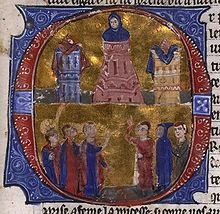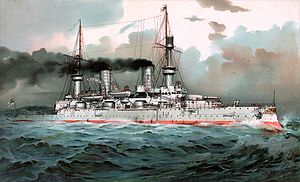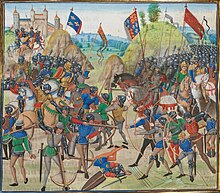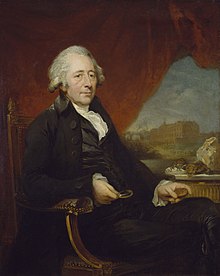
Back Portaal:Geskiedenis Afrikaans Portal:Gschicht ALS በር:ታሪክ Amharic Ingang:Stǣr ANG بوابة:التاريخ Arabic قيسارية:تاريخ ARY بوابة:التاريخ ARZ Портал:Тарих AV Tuveli:Izvopa AVK Portal:Tarix Azerbaijani
The History Portal
History (derived from Ancient Greek ἱστορία (historía) 'inquiry; knowledge acquired by investigation') is the systematic study and documentation of the human past. History is an academic discipline which uses a narrative to describe, examine, question, and analyze past events, and investigate their patterns of cause and effect. Historians debate which narrative best explains an event, as well as the significance of different causes and effects. Historians debate the nature of history as an end in itself, and its usefulness in giving perspective on the problems of the present.
The period of events before the invention of writing systems is considered prehistory. "History" is an umbrella term comprising past events as well as the memory, discovery, collection, organization, presentation, and interpretation of these events. Historians seek knowledge of the past using historical sources such as written documents, oral accounts or traditional oral histories, art and material artifacts, and ecological markers.
Stories common to a particular culture, but not supported by external sources (such as the tales surrounding King Arthur), are usually classified as cultural heritage or legends. History differs from myth in that it is supported by verifiable evidence. However, ancient cultural influences have helped create variant interpretations of the nature of history, which have evolved over the centuries and continue to change today. The modern study of history is wide-ranging, and includes the study of specific regions and certain topical or thematic elements of historical investigation. History is taught as a part of primary and secondary education, and the academic study of history is a major discipline in universities.
Herodotus, a 5th-century BCE Greek historian, is often considered the "father of history", as one of the first historians in the Western tradition, though he has been criticized as the "father of lies". Along with his contemporary Thucydides, he helped form the foundations for the modern study of past events and societies. Their works continue to be read today, and the gap between the culture-focused Herodotus and the military-focused Thucydides remains a point of contention or approach in modern historical writing. In East Asia a state chronicle, the Spring and Autumn Annals, was reputed to date from as early as 722 BCE, though only 2nd-century BCE texts have survived. The title "father of history" has also been attributed, in their respective societies, to Sima Qian, Ibn Khaldun, and Kenneth Dike. (Full article...)
Featured picture
Did you know (auto generated)

- ... that throughout the history of education in Wales, schools have been held in monastic settlements, cathedrals, residential houses, marketplaces, barns, churches, and village halls?
- ... that public health measures and advances in medical science in modern human history helped raise global life expectancy from about 31 years in 1900 to over 66 years in 2000?
- ... that in 2023, car manufacturer Rivian acquired the historic Lynn Theatre in Laguna Beach, California, and converted it into its first showroom?
- ... that the Oxtongue River, historically a canoe route for indigenous people, is still used for recreational canoeing?
- ... that Jenny Cavnar is the first female primary play-by-play announcer in Major League Baseball history?
- ... that Frederica Planta designed cards to teach the children of George III and Queen Charlotte the history of England?
Matthew Boulton FRS (/ˈboʊltən/ BOHL-tən; 3 September 1728 – 17 August 1809) was an English businessman, inventor, mechanical engineer, and silversmith. He was a business partner of the Scottish engineer James Watt. In the final quarter of the 18th century, the partnership installed hundreds of Boulton & Watt steam engines, which were a great advance on the state of the art, making possible the mechanisation of factories and mills. Boulton applied modern techniques to the minting of coins, striking millions of pieces for Britain and other countries, and supplying the Royal Mint with up-to-date equipment.
Born in Birmingham, he was the son of a Birmingham manufacturer of small metal products who died when Boulton was 31. By then Boulton had managed the business for several years, and thereafter expanded it considerably, consolidating operations at the Soho Manufactory, built by him near Birmingham. At Soho, he adopted the latest techniques, branching into silver plate, ormolu ("gilt bronze") and other decorative arts. He became associated with James Watt when Watt's business partner, John Roebuck, was unable to pay a debt to Boulton, who accepted Roebuck's share of Watt's patent as settlement. He then successfully lobbied Parliament to extend Watt's patent for an additional 17 years, enabling the firm to market Watt's steam engine. The firm installed hundreds of Boulton & Watt steam engines in Britain and abroad, initially in mines and then in factories. (Full article...)
On this day
November 21: Armed Forces Day in Bangladesh
- 1894 – First Sino-Japanese War: After capturing the Chinese city of Port Arthur, the Japanese army began a massacre of the city's soldiers and civilians.
- 1959 – American disc jockey Alan Freed (pictured), who popularized the term rock and roll, was fired from WABC-AM for his role in the payola scandal.
- 1964 – The Verrazzano-Narrows Bridge, connecting Staten Island and Brooklyn in New York City, opened to traffic as the longest suspension bridge in the world at the time.
- 1974 – Bombs exploded in two pubs in central Birmingham, England, killing 21 people and leading to the imprisonment of six people who were later exonerated.
- 2009 – An explosion in a coal mine in Heilongjiang, China, killed 108 miners.
- Voltaire (b. 1694)
- Hetty Green (b. 1834)
- Milka Planinc (b. 1924)
- Catherine Bauer Wurster (d. 1964)
Selected quote
What is the use of living, if it be not to strive for noble causes and to make this muddled world a better place for those who will live in it after we are gone?
— Winston Churchill, British statesman
Related portals
More Did you know...
- ... that the Japanese aircraft carrier Amagi (wreck pictured) capsized on 29 July 1945 as a result of cumulative damage inflicted by American airstrikes on 24 and 28 July?
- ... that Scandinavian influence in Scotland, still evident today, was probably at its height during the time of Thorfinn the Mighty?
- ... that, after the 2003 invasion of Iraq, the Bassetki statue, which is more than 4,200 years old, was found in a cesspool?
- ... that in medieval art, angels were often depicted wearing feather tights?
- ... that 49% of German military losses happened in the last 10 months of the Second World War in Europe?
- ... that Joshua L. Goldberg, the first rabbi to serve as a World War II U.S. navy chaplain, was a Russian army deserter?
- ... that Richard Nixon chose the Wilson desk as his Oval Office desk because he believed it was used by Woodrow Wilson, informed that it was used by Henry Wilson, Vice President under Ulysses S. Grant, but actually bought by Garret Augustus Hobart, 24th Vice President of the United States under President William McKinley?
- ... that some of the nominally silver Roman coins from the Bredon Hill Hoard only have a 1% silver content?
Topics
Categories

History • By period • By region • By topic • By ethnic group • Historiography • Archaeology • Books • Maps • Images • Magazines • Organizations • Fictional • Museums • Pseudohistory • Stubs • Timelines • Chronology • People • Wikipedia historians
WikiProjects
![]() WikiProject History •
Ancient Near East • Australian History • Classical Greece and Rome • Dacia • Former countries • History of Canada • Chinese history • European history • Heraldry and vexillology • Indian history • Jewish history • Medieval Scotland • Mesoamerica • Military history • Middle Ages • History of Science
WikiProject History •
Ancient Near East • Australian History • Classical Greece and Rome • Dacia • Former countries • History of Canada • Chinese history • European history • Heraldry and vexillology • Indian history • Jewish history • Medieval Scotland • Mesoamerica • Military history • Middle Ages • History of Science
WikiProject Time • Days of the Year • Years
WikiProject Biography • Composers • Political figures • Saints • United States Presidents
Things you can do
 |
Here are some tasks awaiting attention:
|
Associated Wikimedia
The following Wikimedia Foundation sister projects provide more on this subject:
-
Commons
Free media repository -
Wikibooks
Free textbooks and manuals -
Wikidata
Free knowledge base -
Wikinews
Free-content news -
Wikiquote
Collection of quotations -
Wikisource
Free-content library -
Wikiversity
Free learning tools -
Wiktionary
Dictionary and thesaurus























































